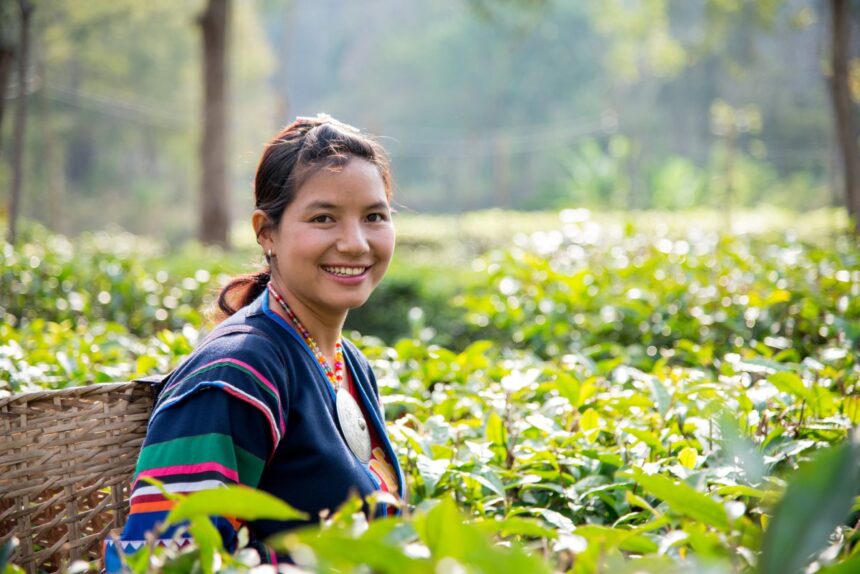Surrounded by rolling hills and scenic landscapes, Chiang Rai quickly became Thailand’s hub for tea lovers. Known for its lush plantations and unique varieties like Oolong and Green tea, this northern province offers more than just a drink—it’s a cultural experience.
Places like Choui Fong Tea Plantation attract visitors, and Chiang Rai blends tradition with modern tea tourism, making it a must-visit for anyone curious about Thai tea.
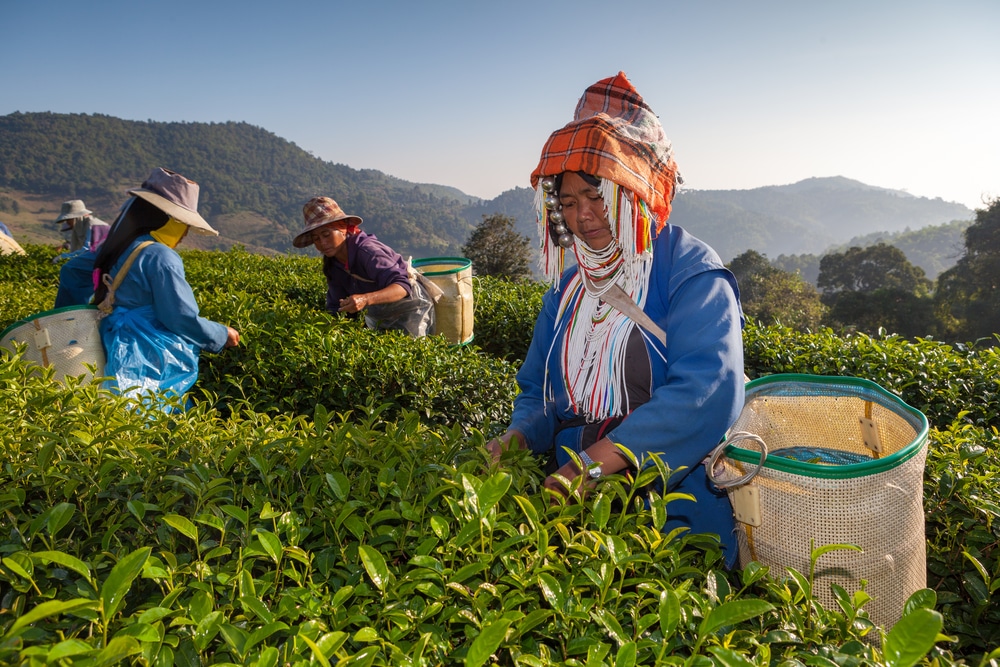
The Tea Plantations of Chiang Rai
Chiang Rai is a treasure trove for tea enthusiasts. Its cool climate and high-altitude terrain create the perfect conditions for cultivating world-class teas. Beyond the quality of the tea leaves, visitors are drawn to the stunning views, cultural heritage, and immersive experiences offered by its plantations. Two key destinations are Choui Fong Tea Plantation and 101 Tea Plantation in Doi Mae Salong.
Choui Fong Tea Plantation
Located amidst Chiang Rai’s lush hills, Choui Fong Tea Plantation has become a hallmark of Thai tea culture. Its sprawling landscape is a photographer’s dream, with rows of vibrant green tea bushes blanketing the hills. The plantation is not just about the views—every corner is designed to offer an immersive experience.
Visitors can explore the tea fields, learn about the cultivation process, and indulge in freshly brewed tea onsite. The plantation’s modern cafe, with its panoramic terrace, serves everything from hot teas to desserts infused with locally grown tea leaves. Green tea cakes and Oolong tea smoothies are fan favourites.
Choui Fong is renowned for its Oolong, Green, and Black teas. Each cup reflects the plantation’s dedication to quality, making it a favourite for local connoisseurs and travellers. Whether you sip tea while taking in the views or visit the gift shop for premium loose-leaf tea, you’ll walk away with a deeper appreciation for Thai tea craftsmanship.
101 Tea Plantation in Doi Mae Salong
In the highlands of Doi Mae Salong, the 101 Tea Plantation is steeped in tradition. Known as a leader in producing premium Oolong tea, the plantation combines ancestral techniques with a commitment to sustainability. It’s not just a tea farm; it’s a living museum of Thai tea heritage.
This plantation attracts visitors looking to experience the authentic process of making Oolong tea. Every step is done precisely, from carefully plucking the tea leaves to using intricate drying and rolling techniques. Guests also have the chance to participate in tea-tasting sessions, sampling the plantation’s award-winning blends.
The surrounding area of Doi Mae Salong adds to the charm with its misty mountains and peaceful atmosphere. The drive to the plantation alone, with winding roads and scenic vistas, is worth the trip. The plantation also plays a significant role in establishing Chiang Rai’s reputation as a top-tier tea destination, drawing travellers from all over the globe.
With every visit to these plantations, you’re not just sampling tea; you’re stepping into the heart of Chiang Rai’s rich tea tradition.
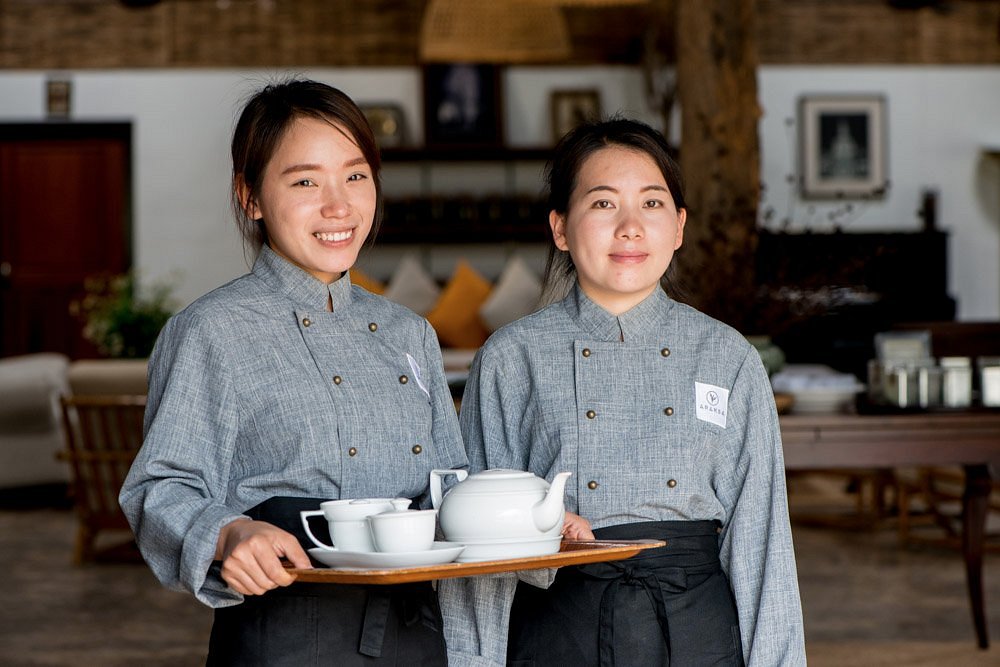
Popular Types of Tea in Chiang Rai
Chiang Rai is a tea lover’s paradise, offering a variety of flavours that cater to every palate. Its cool climate and fertile soil create an ideal environment for tea cultivation, producing everything from delicate green teas to rich black teas. Whether you’re a purist or enjoy modern twists on classic options, the region has something for everyone.
Green Tea and Jasmine Green Tea
Green tea is a staple of Chiang Rai’s tea culture, prized for its natural, grassy flavour and refreshing finish. Lightly oxidized, this tea is known for its clean taste, reminiscent of fresh-cut grass and subtle sweetness. On the other hand, Jasmine green tea takes the experience up a notch. The tea leaves are infused with jasmine blossoms, giving it a floral aroma that feels like spring in a cup.
These teas hold cultural importance in Thailand. They are often served during ceremonies or shared with family and friends to symbolize peace and well-being. Beyond tradition, they’re also enjoyed for their health benefits, including antioxidants and a gentle energy boost—perfect for those seeking a mindful lifestyle.
Black Tea
Black tea is another local favourite with its robust flavour and deep amber hue. It offers a bolder taste than green tea, with hints of malt or chocolate depending on the blend. In Chiang Rai, black tea is often used as the base for Thai iced tea, giving it that distinctive strong yet creamy profile loved worldwide.
Green Milk Tea
Green milk tea represents a modern twist on traditional Thai tea. Made with green tea, sweetened condensed milk, and sometimes a splash of coconut milk, this tea delivers a creamy texture that feels luxurious without being heavy. The balance of sweetness and creaminess elevates the refreshing notes of green tea, creating a drink that appeals to both tea purists and those new to Thai tea.
Its rising popularity reflects a shift in how tea is enjoyed in Chiang Rai. With younger generations seeking unique flavours and textures, green milk tea has become a go-to option for cafes and street vendors. It captures the essence of traditional Thai tea while embracing a more playful, contemporary identity.
Thai Tea
Thai tea is a sweet, creamy drink made from black tea, sugar, and condensed milk. It gets its bright orange colour from food colouring or spices like star anise. Served over ice, it’s refreshing and packed with flavour. Whether sipping Thai Tea at a Thai restaurant or making it at home, it’s a simple treat that hits the spot.
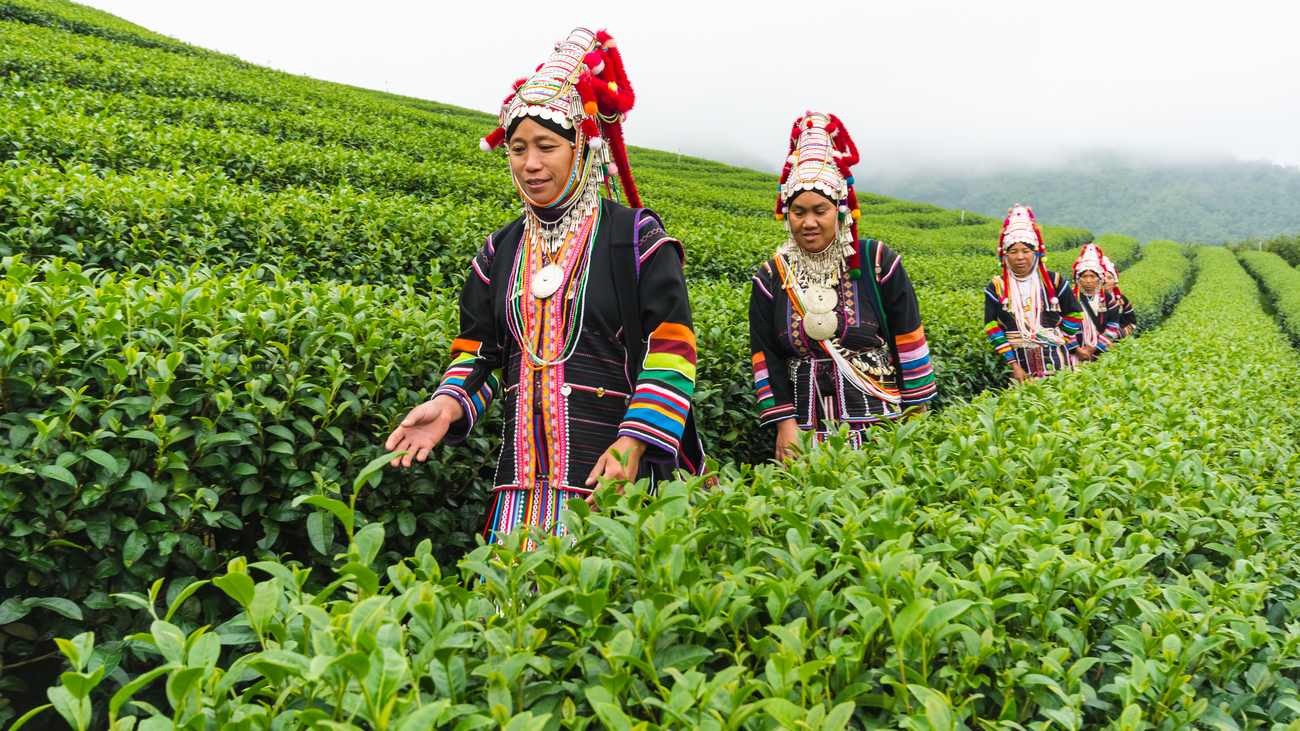
The Role of Tea in Thai Culture and Tourism
Chiang Rai is not just a hotspot for tea production; it’s a region with deep cultural significance. Tea forms part of daily life, hospitality, and even art in Thailand. With roots in Chinese and indigenous traditions, tea has become a symbol of unity, relaxation, and culinary finesse in Northern Thailand. For tourists in Chiang Rai, tea is a beverage and a gateway to experiencing the region’s unique blend of heritage and modernity.
Tea Tastings and Workshops
Chiang Rai offers travellers hands-on experiences that make tea more than just something you drink. Tea tastings and workshops are common at plantations like Choui Fong and 101 Tea Plantation, allowing visitors to dive into tea processing and flavours. Imagine watching freshly plucked leaves transform into aromatic brews while sipping Oolong tea.
Workshops often guide visitors through traditional processing techniques, like hand-rolling leaves or understanding oxidation levels. Tastings test the palate, with participants trying multiple teas and learning to identify subtle notes—herbaceous, floral, or nutty. Some sessions focus on pairing tea with snacks, showing how the flavours enhance one another. It’s an interactive way to appreciate the craftsmanship behind each cup.
For those keen to bring the tea experience home, many locations offer DIY kits or even lessons on brewing their perfect pot. This immersive approach not only educates but also deepens appreciation for the artistry of Thai tea.
Tea in Northern Thai Cuisine
Tea goes beyond the teapots into Northern Thai cuisine, adding unique flavours and textures to local dishes and desserts. Chiang Rai embraces this trend, intertwining tea with its culinary identity. Think of it as taking the essence of the tea field and pouring it onto your plate.
Tea leaves, particularly young and tender ones, are used in salads, lending a slightly astringent yet fresh taste. Fermented tea leaves, known as “miang,” are a Northern Thai delicacy often paired with peanuts, lime, and shallots for a tangy, savoury flavour. This dish tastes great and connects diners to a centuries-old tradition.
Desserts infused with tea are also local favourites. Green tea cakes, Oolong-infused ice cream, and jasmine tea panna cotta are just a few examples that delight sweet-toothed visitors. These creations combine tea’s earthy and floral notes with creamy textures, combining old and new.
Tea’s role in the kitchen isn’t limited to flavour. It’s also a natural ingredient reflecting the region’s commitment to sustainable and local produce. Chiang Rai showcases its versatility and creativity by incorporating tea into traditional and contemporary recipes. For travellers, it’s an opportunity to taste the culture—literally.
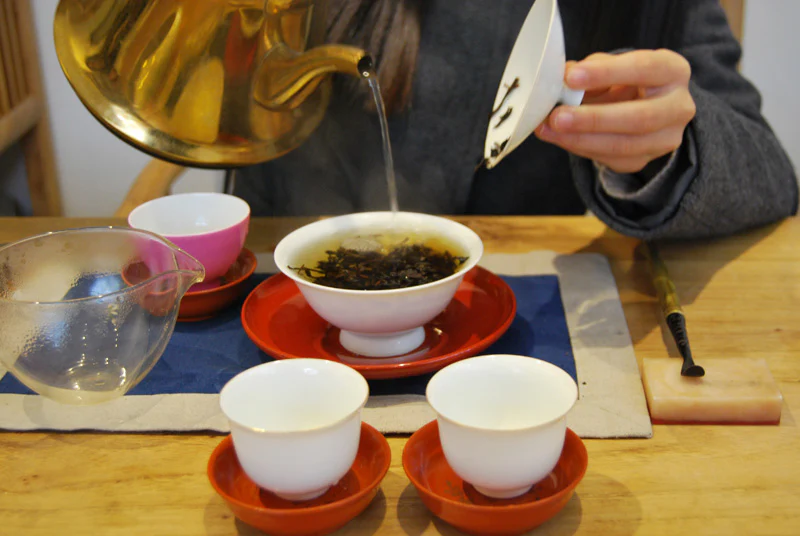
Sustainability and the Future of Tea in Chiang Rai
Chiang Rai is gaining respect not just for the quality of its tea but also for its sustainability efforts. As the global market increasingly values environmentally friendly practices, the region’s tea plantations are setting an example by merging tradition with responsibility. Whether organic farming or influencing international markets, Chiang Rai’s tea industry is evolving.
Chiang Rai demonstrates how focusing on quality and sustainability can open doors to global markets. By merging tradition with modern practices, the province sets a standard for premium tea production in the years to come.
Chiang Rai’s tea culture blends natural beauty with rich traditions, offering a unique experience for enthusiasts and casual visitors. From the rolling fields of Choui Fong to the heritage-driven 101 Tea Plantation, every destination showcases the artistry and passion behind Thai tea.
Whether tasting premium Oolong, enjoying a jasmine-infused dessert, or exploring sustainable farming practices, visitors leave with more than just a cup of tea—they take home a story. Plan your visit and immerse yourself in the flavours and history that make Chiang Rai a true tea lover’s paradise.

Geoff Thomas is an award winning journalist known for his sharp insights and no-nonsense reporting style. Over the years he has worked for Reuters and the Canadian Press covering everything from political scandals to human interest stories. He brings a clear and direct approach to his work.




